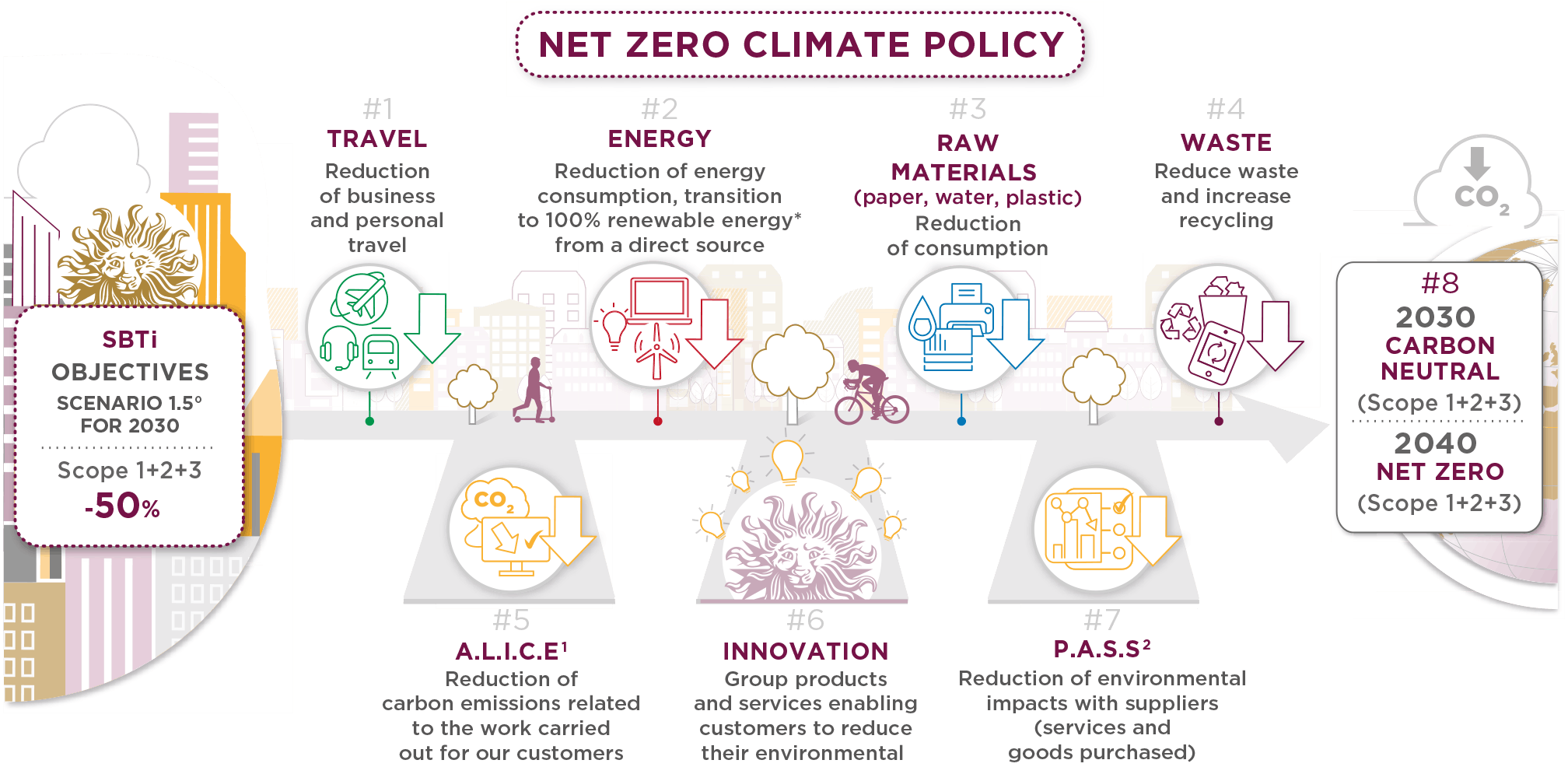
NET ZERO CLIMATE POLICY
SBTi OBJECTIVES
SCÉNARIO 1,5° FOR 2030
Scope 1+2+3 -50%
#1 TRAVEL:
Reduction of business and personal travel
#2 ENERGY:
Reduction of energy consumption, transition to 100% renewable energy* from a direct source
#3 RAW MATERIALS:
(paper, water, plastic) Reduction of consumption
#4 WASTE:
Reduce waste and increase recycling
#5 A.L.I.C.E1:
Reduction of carbon emission related to the work carried out for our customers
#6 INNOVATION:
Groups products and services enabling customers to reduce their environmental
#7 P.A.S.S2:
Reduction of environmental impact with suppliers (services and goods purchased)
#8 2030 CARBON NEUTRAL:
(Scopes 1+2+3),
2040 NET ZERO:
(Scopes 1+2+3)
* Renewable energies
- 1 A.L.I.C.E : Advertising Limiting Impacts & Carbon Emissions
- 2 P.A.S.S : Publicis Groupe Providers Platform for a self-Assessment for a Sustainable Supply-chain
The “Zero Impact Climate Policy” is structured around the following eight points:
- Reduction in transport (particularly air travel) and its impacts through working from home and the use of teleconferencing tools; encouraging lower-emission modes of transport (such as public transport, Green cabs, electric, hybrid or smaller company cars, etc.) or alternative mobility solutions (bicycles);
- Reduction in energy consumption and switch to 100% direct-source renewable energy and improvements in energy efficiency (by seeking to limit the impacts of electricity, heating and air conditioning);
- Reduction in consumption of natural resources and raw materials (mainly paper, water, plastics). The global plan launched at the beginning of 2020, to eliminate single-use plastics (Zero Single Use Plastic) from all agencies in order to rapidly comply with the ambitious objectives of the plan voted by the European Parliament, remains a priority;
- Waste volume reduction: systematic use of recycling channels, in particular for electronic and IT products (WEEE), and organized management of non-hazardous waste (the Groupe does not have hazardous waste);
- Reduction in the impact of campaigns and projects carried out for clients: the Groupe has created an internal impact assessment platform called A.L.I.C.E (Advertising Limiting Impacts & Carbon Emissions), which makes it possible to measure and find less impactful options (see Section 4.2.2);
- Product and service innovation at branch and even country level, with new solutions offered to clients to support their energy and environmental transition. In 2021, Publicis Sapient rolled out its eMission solution, enabling its clients in the energy sector to monitor their emissions in real time and manage them much effectively;
- Reduction of impacts related to goods and services purchased: this is reflected in the increased commitment of suppliers to the Paris Agreement and the 1.5°C scenario, thanks to a self-assessment of their CSR and environmental approach using the P.A.S.S. (Publicis Groupe Providers’ Platform for a self-Assessment for a Sustainability Supply chain) internal platform or through an external CSR assessment validated by an independent third party (EcoVadis or other) covering the actions taken to combat climate change, see Section 4.2.7;
- Carbon neutrality for the entire Groupe as soon as possible and by 2030, options to obtain RECs (Renewable Energy Certificates) or VCCs (voluntary carbon credits) to compensate for the irreducible impacts, being those of last resort, or to deal with a local shortfall in the renewable energy market, for example. The Net Zero target set for 2040 involves a 90% reduction in carbon emissions and a decarbonization plan.
The summary table of key data can be found at the end of this section.
